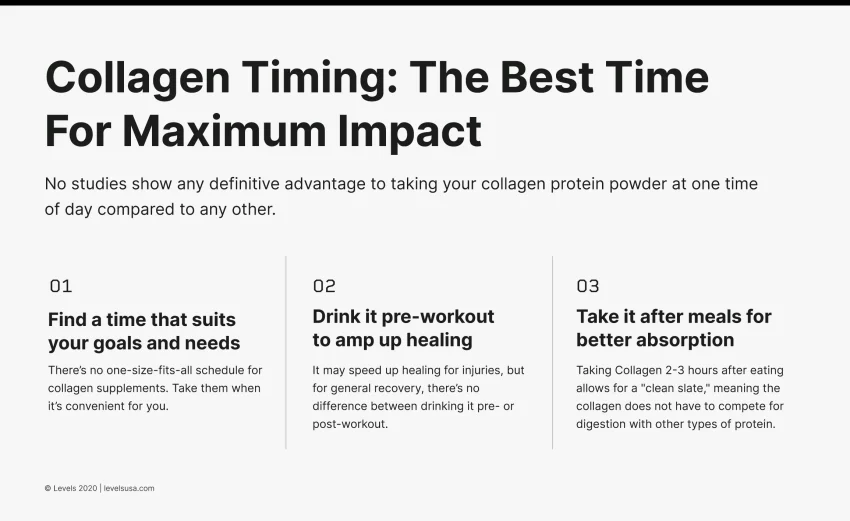Collagen is important for skin health, elasticity, and hair, nail, and bone health. The natural production of collagen by the body slows down from age 25, so experts advise taking it extra.
The preservation of fibroblast activity and preventive collagen stimulation is an adequate strategy for preventing ageing.
- Bones and healthy joints. Collagen is an effective substance that not only supports the health of the joints but also reduces the risk of deterioration in their condition.
- Healthy skin. The supplement stimulates collagen production, increasing or maintaining the skin’s tone, elasticity and firmness because, after 25 years, collagen production in the skin slows down every year.
- Reduced risks. Collagen improves blood circulation and reduces the risk of type 2 diabetes.
- No extra pounds. Collagen can help you shed a few pounds by boosting your metabolism. A component of collagen called glycine will help move sugar into your tissues, providing them with a boost of energy.
- Digestion. Collagen can ease digestive upsets, especially for those with the leaky gut syndrome.
- New victories without unnecessary injuries. Some sports supplements also use collagen. This is necessary to increase endurance and increase muscle mass. By using collagen supplements, you can reduce the risk of injury and provide timely support to the joints.
- Hormonal balance. Since proteins can rebalance hormones, adding collagen to the diet can benefit hormonal levels.
- Improving the quality of sleep. Adding collagen to your diet can improve sleep quality and prevent daytime sleepiness.
What is hydrolyzed collagen?
Hydrolyzed collagen is obtained by enzymatic hydrolysis (enzymatic cleavage in acidic or alkaline media at a certain temperature). It contains a set of low molecular weight amino acids and polypeptides that are more available for absorption in the human body. Amino acids entering the blood are accumulated in connective tissues and cells and can become building material for the biosynthesis of the matrix of these tissues.
At what age can you start taking collagen?
To achieve maximum results, it is better to take neocell super collagen from the age of 20. From this age, the dermis’s thickness begins to decrease annually by 1-1.7% without subsequent natural recovery. By the age of 30, collagen deficiency is already becoming noticeable. It is better to take collagen preventively.
Collagen of what origin is better (marine, animal, vegetable)?
Animal Collagen
This type of collagen is obtained during the processing of cartilage, skin and joints of mammals and birds. The simplest and most affordable of all types of collagen.
- Well absorbed when taken internally.
- Due to the large molecule, it does not penetrate well through the dermis
- Affordable price
- Ease of storage
When applied externally, animal collagen is ineffective; a cream or serum with such collagen will not help restore collagen fibres.
Animal collagen shows good results when taken orally.
marine collagen
A product obtained from the epidermis tissues of fish and other sea creatures. Such a protein is considered more effective than animal protein, as it is completely absorbed through the intestinal walls when it enters the body. The production technology requires special equipment and high-quality transportation. This requires careful storage, which is why its cost is usually higher.
- Well absorbed when taken internally.
- Molecule closest to human
- Better pass through the dermis
- Promotes native collagen production
- Difficulties in production. higher price
Marine collagen is ideal for producing creams and cosmetic serums; its molecule is much smaller than the animal collagen molecule and perfectly penetrates the deep layers of the epidermis. When taken orally, fish collagen has an effective therapeutic effect on joints, ligaments, and skin and is involved in producing collagen.
Vegetable Collagen
There is also the so-called plant collagen, although this definition is incorrect. Vegetable collagen is a wheat protein obtained through a hydrolysis process. It is close in composition to animal collagen and is also widely used in cosmetics and dietary supplements.
The structure is similar to an animal but cannot be called collagen
- Hypoallergenic
- Well absorbed on the surface of human skin
- Complex production
- Very high price
Types of collagen. What problems does each solve?
Type 1 collagen is found in all tissues in the human body. This component is responsible for elasticity, water balance and absorption of nutrients. It is collagen for skin, bones and connective tissues.
2nd type of collagen – is collagen for joints and tendons. The element acts as a medicinal and prophylactic agent for rheumatism, arthritis and other diseases and inflammations. Used in both food supplements and ointments. This type requires a careful approach and a special dosage in the treatment.
The 3rd type of collagen is also called the “young” component. Responsible for elasticity, metabolism and the condition of skin cells in general (including hair and nails).
Forms of collagen: liquid (drinkable), powder, capsules. Which is better?
Tablets (capsules) contain the active substance and additional components necessary to create and maintain a compact form. Due to these excipients, the percentage of protein here is slightly lower than in other forms. As a result, the daily portion of tablets can reach up to 6 tablets per day.
The powder is convenient because it can be added to liquid mixtures, shakes and smoothies. This is the most affordable and economical form of the drug.
Potable (liquid) collagen is the most enriched form of the drug. In addition to the protein itself, it usually contains the vitamins and minerals needed for synthesis. The more hydrolyzed the solution; the easier it is for the body to absorb them.
What supplements should be taken with collagen for better absorption?
This is, first of all, vitamin C. Soluble or in the form of tablets (capsules) – any vitamin C in an adequate concentration improves the absorption of collagen. It is enough to take the daily norm of vitamin C (60 mg) to achieve the desired result.
Sex hormones. We need lecithin (choline and inositol fractions) and magnesium. These elements are the most important participants in all hormonal processes occurring in our bodies.
Multivitamin complexes. Our body is a single whole, and all the processes occurring in it are interconnected. A deficiency of at least one of the elements threatens to fail in the assimilation and synthesis of others, so the vitamins and microelements of these complexes will be very useful.
Silicon additives. Collagen is a supplier of amino acids-building blocks for the synthesis of its own collagen, and silicon stimulates this process, being its obligatory participant.
Also popular collagen supplements: are coenzyme Q10 and hyaluronic acid.
A complex of glucosamine, chondroitin and MSM is for those who want to improve their skin condition and carry out joint prevention.
What is Vitamin C in Liquid Collagen?
It enhances the absorption of collagen and stimulates the production of collagen in the dermis.
What supplements should not be taken with collagen?
Do not dissolve collagen in drinks containing proteins, as they will impair absorption.
Contraindications for taking collagen?
Collagen is contraindicated in case of individual intolerance to any of the components of the product with its content.
What benefits of Japanese Marine HSC Collagen Premium Oral?
- A unique combination of marine and natural ingredients.
- A multi-component product is a multi-functional action.
- Low molecular weight ensures quick, easy and complete absorption of the drug’s components.
- The liquid form is convenient and easy to use and digest.
- A single dose of 20 ml is exactly 1 vial of the drug per day.
What is the duration of the HSC Collagen Premium course, and how to take it?
They drink collagen in the morning on an empty stomach because when the supplement enters the gastrointestinal tract from food, it is easier for the body to recognize it and break it down into amino acids. If the dietary supplement is taken more than once daily, you should drink it 4 hours after the previous meal and 30 minutes before the next meal.
- For adults, one vial (20 ml) per day or every other day
- Minimum course: 15 vials (3 blisters)
- Recommended 3-4 courses per year
- Packing: 3 blisters, 1 blister x 5 vials

